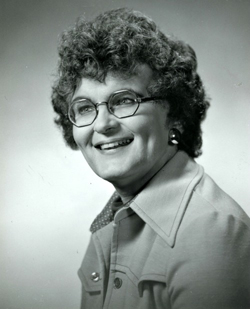
Peggy Ann Brainerd Way, the first woman to be appointed to a full-time position on the Vanderbilt Divinity School faculty, died July 9 in Nashville after a brief illness. She was 84 years old.
Way accepted a position in pastoral theology at Vanderbilt in 1977 from then-Divinity Dean Sallie McFague, whose own appointment was part-time then.
Way had taught at the University of Chicago Divinity School, where she was also the first woman with a full-time faculty appointment. In addition, she was the first of two women to teach at the Jesuit School of Theology in Chicago. She also was the first woman faculty member in a field other than Christian education at McCormick Theological Seminary.
“Peggy Way linked two eras in American theological education,” said Volney Gay, professor of religious studies, psychiatry and anthropology at Vanderbilt and a colleague during Way’s time at Vanderbilt. “She was trained in a period of traditional hierarchies, when men dominated all aspects of training. She came of age as an advocate for welcoming women into every aspect of education and leadership. [lquote]She matured into a leading voice of expanded equity and spiritual depth for her church, her school and her community.”[/lquote]
Way, who was born in Michigan on Oct. 8, 1931, graduated summa cum laude from the University of Michigan with a bachelor of arts in 1953. She then enrolled at Wayne State University, where she earned a master of social work in 1956. In addition, the University of Chicago Divinity School and Chicago Theological Seminary jointly awarded a bachelor of divinity (now master of divinity) to Way in 1959.
Way was ordained in the United Church of Christ in 1960. She and her late husband, the Rev. William F. Way, had met and fallen in love while both were social workers. They went to seminary together and were their denomination’s first clergy couple to be ordained in a joint celebration.
They became co-pastors of Craigin Congregational Church in Chicago. She also was a community organizer and executive director of some social welfare agencies serving at-risk neighborhoods.
Way was a sought-after speaker, lecturer and preacher, both in the United States and abroad. She delivered a groundbreaking sermon titled “You Are Not My God, Jehovah” at the Rockefeller Chapel of the University of Chicago in 1968.
In 1973, Way earned a doctorate of divinity from Christian Theological Seminary and Doane College. She then pursued a doctorate of philosophy from Princeton Theological Seminary, where she studied under Seward Hiltner, one of the founders of contemporary pastoral psychotherapy, and earned that degree in 1979.
Way served on the Vanderbilt Divinity faculty from 1977 to 1987. She later taught at Eden Theological Seminary in St. Louis, where she was honored with a distinguished chair for excellence in teaching. She was an emerita faculty member at Eden at the time of her death.
Way also was an adjunct professor at Argosy University in Nashville, where she was the program coordinator for a doctoral program in pastoral community counseling. Way’s areas of expertise included teaching introductory pastoral theology and counseling, personality theory, family dynamics and pastoral practice, human sexuality, multicultural counseling, feminist theology, group counseling dynamics, ethics in counseling and gender studies. Her publications included Created by God: Pastoral Care for All God’s People and Living and Caring in Perilous Times (Chalice Press, 2003).
Kim Maphis Early, who earned her master of divinity from Vanderbilt in 1981, interviewed Way for the book chapter “Women’s Work,” which was part of Vanderbilt Divinity School: Education, Contest, and Change (edited by Dale A. Johnson).
Early wrote,”Way confessed that she ‘would not have been nearly as open to coming to Vanderbilt had Sallie (McFague) not been dean, because all the other schools on whose faculties I have served had male deans, and I decided that last time I was on a faculty that I wouldn’t join another faculty in which I was the only woman. As a woman, I have always been in oversupply for the number of places that wanted me.'”
Early noted that Way’s office was located on the school’s ground floor, unlike other faculty and staff offices, due to a mobility impairment. She had contracted polio in 1944 at the age of 13. Early wrote, “Her door almost always open, Way’s office became the gathering place for women and men. Faculty as well as students counted on her generosity as mentor and counselor.”
Way donated her body to Vanderbilt University Medical Center. A memorial service is scheduled at 2 p.m. Aug. 7 at Glendale Baptist Church in Nashville.